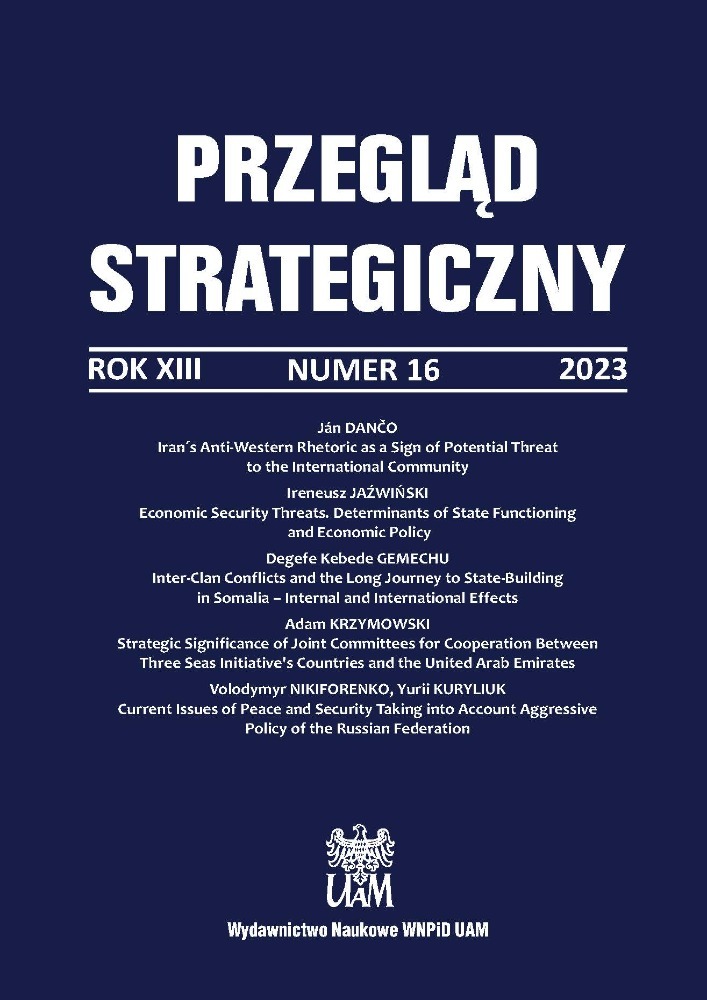Abstract
The Black Sea region is increasingly becoming a priority on the international agenda. In fact, a regional approach is emerging as actors understand that common problems need to be addressed jointly. Nevertheless, cooperation efforts are hampered by a number of factors, such as uneven economic and political development within and among countries, nationalist forces, and longstanding animosities between regional players. In this context, it is imperative to foster sound policies aimed at strengthening dialogue and cooperation so as to contain and ultimately resolve conflicts with peaceful means. However, there is little policy-oriented research on the challenges and opportunities for cooperation in the Black Sea region. The purpose of this paper is to assess the impact of terrorism and its dangers towards the Black Sea region. The work also describes the significance of international terrorism and its general definitions. Besides, the result and findings are based on theoretical studies and assumptions and the result of the analysis of the “Case Study” of the Black Sea region. Case study examines how the Black Sea region influences the spread of terrorism and what threats it poses for this region. Furthermore, the aspects of what makes the region important on international arena are analyzed and the existent and potential security issues are examined, as well as strategic importance of the region for the EU and NATO is analyzed even from academic framework – “Securitization” theory (Buzan, Wæver, De Wilde, 1998). The theory is based on security studies conceptual background and the background spectrum includes: the Copenhagen School and Critical security studies as the type (Ondrejcsak, 2014). Moreover, the Black Sea regional security and geopolitics are to be reviewed and scrutinized in several modalities in aegis of the Securitization theory, like military and economic sectors. The hypothesis provides provision that the Black Sea regional security has already became indispensable part of the contemporary international security system and determines tendency in geostrategic balance at global level. In addition to that the Black Sea Region has to contend with numerous threats of a conventional and non-conventional kind. These hard and soft security problems make the region volatile, insecure and unstable. That is why the region is very vital for inter-governmental organizations, dealing with military security (NATO case) and local actors in case of Georgia’s national security.
References
Beraia E. (2017), The U.S. Foreign Policy Priorities in the Post-Cold War Period (1990–2016): Georgia’s Case from Transnational Challenges (Including Migration) towards Enhancing Institutional Transformation, Black Sea University, Tbilisi.
Black Sea Synergy – A New Regional Cooperative Initiative (2007), https://eur-lex.europa.eu/LexUriServ/LexUriServ.do?uri=COM:2007:0160:FIN:EN:PDF.
Buzan B., Wæver O., De Wilde J. (1998), Security: A new framework for analysis, Lynne Rienner Publishers, London. DOI: https://doi.org/10.1515/9781685853808
Chifu I., Sauliuc A., Nedea B. (2010), Energy security strategies in the wider Black Sea Region, Editura Institutului de Ştiinţe Politice şi Relaţii Internaţionale, Bucharest.
Fiedler R., Stelmach A. (2018), Beyond Europe: Politics and Change in Global and Regional Affairs, Logos Verlag Berlin, Berlin.
Kaplan R. D. (2012), The Revenge of Geography, Random House Trade Paperbacks, New York.
Maisaia V. (2007), The Caucasus-Caspian Regional and Energy Security Agendas – Past, Contemporary and Future Geopolitics: View from Georgia, IREX, Brussels.
Maisaia V. (2023), Wojny Czwartej Generacji: Kontekst NATO i Kaukazu Poludniowego, Wydawnictwo “Mtsignobari”, Tbilisi.
Minix D., Hawley S. (1998), Global Politics, Wadsworth Publishing Company, New York.
NATO: Deterence and Defence (2023), https://www.nato.int/cps/en/natohq/topics_133127.htm.
NATO Warsaw Summit Communique (2016), https://www.nato.int/cps/en/natohq/official_texts_133169.htm.
Ney V. (1967), Evolution of A Theater Operations Headquarters, 1941–1967, HQ USA Army Combat Developing Command Fort Belvoir, Virginia. DOI: https://doi.org/10.21236/AD0675414
Ondrejcsak R. (2014), Introduction to Security Studies, Centre for European and North Atlantic Affairs, Bratislava.
Petriashvili S. (2019), The Shift of Dominance in the Black Sea, New Eastern Europe, Poland.
Scott M., Alcenat W. (2008), Revisiting the Pivot: The Influence of Heartland Theory in Great Power Politics, Macalester College, Saint Paul.
Starr F. (2023), It’s Time to Drop Eurasia, American Purpose, https://www.americanpurpose.com/articles/its-timetodropeurasia/?mc_cid=792ef479e1&mc_eid=cdf424e6e4&fbclid=IwAR2a_oJAwI6VuunPXDmjlNEJeOANXovD3m_AQyn5AYvzfQG63g2HcQRAUTg.
Tuathail G. O. (1996), Critical Geopolitics: the Politics of Writing Global Space, Routledge, London.
License
Copyright (c) 2023 Vakhtang Maisaia

This work is licensed under a Creative Commons Attribution-ShareAlike 4.0 International License.

